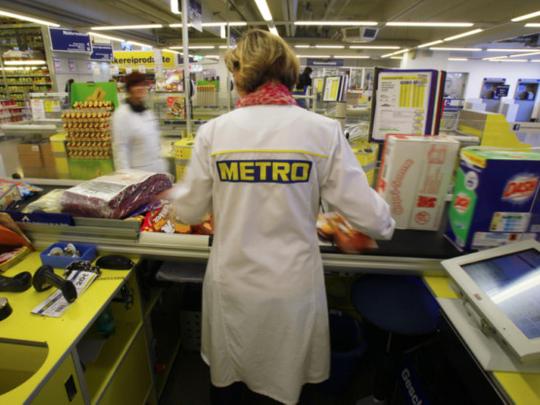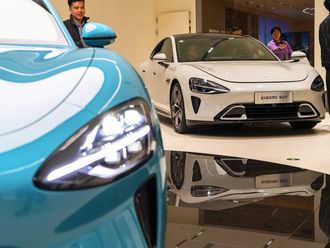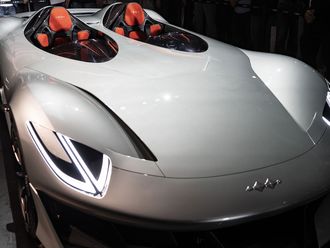
Berlin/Paris: Two of Europe’s top retailers, France’s Carrefour and Germany’s Metro , are making progress in their quests to revive performance in their home markets, with Metro rewarding its chief executive with a contract extension.
Carrefour, Europe’s biggest retailer, and Metro, the number four, have both suffered at home while expanding rapidly into faster-growing emerging markets.
But after cutting costs and revamping stores and product ranges they are starting to reverse years of underperformance from their big out-of-town stores, even as cost-conscious shoppers increasingly shop locally and online.
Carrefour, the world’s second-largest retailer behind Wal-Mart, reported higher first-half profits in its core French business, as well as in Brazil and Argentina, although China stayed under pressure.
The French group said first-half recurring operating profit rose 13.8 per cent to €833 million ($1.12 billion, Dh4.41 billion), while adjusted net income climbed 16.7 per cent at current foreign exchange rates to €274 million.
Metro said sales for its fiscal third quarter, which runs from April to June, fell 2.7 per cent to €14.9 billion, but like-for-like sales rose by 1.7 per cent as it saw a substantial increase at its core cash-and-carry business as well as its Real hypermarkets and Kaufhof department store chains.
Chief Executive Olaf Koch, in charge since 2012, said he was particularly pleased with the performance of cash-and-carry and Real in Germany. Metro said on Thursday the board had extended his contract, due to run one more year, by another three years.
“We are increasingly seeing that our range of products and services, including those in the challenging non-food area, is gaining importance among customers,” Koch said.
However, shares in Metro were down 4.9 per cent by 0925 GMT after the company warned that volatile currency moves could wipe a “high double-digit” million euro figure off its target for 2013/14 earnings before interest and tax (Ebit) before special items of about €1.75 billion.
Metro also slipped to an unexpected attributable loss of €63 million euros in the quarter due to costs to close stores and overhaul its struggling consumer electronics chain Media-Saturn.
Metro shares had already fallen 30 per cent this year, largely due to the company’s exposure to Russia and its decision to delay a stock market listing of a stake in its Russian cash-and-carry operation due to market turmoil over Ukraine.
Carrefour, meanwhile, said the impact of a debt default by Argentina was manageable, but it would slow planned investments in the country.
Carrefour shares, which trade at 16 times forward earnings to 14 times for Metro and 10.8 times for British rival Tesco , were down 3.5 per cent, underperforming a 0.9 per cent weaker European retail stocks index.
Margins vs. low prices
ernstein analyst Bruno Monteyne questioned the sustainability of Carrefour’s 20 basis point improvement in its gross margin in France to 3 per cent after it chose not to cut prices as aggressively as rivals such as Leclerc in the period.
“This will likely negatively affect performance in the medium term with a lack of price competitiveness leading to a future return to market share losses,” Monteyne, who rates Carrefour ‘underperform’, wrote in a note.
In Britain, Tesco is facing a similar dilemma on prices as it loses market share to German discounters Aldi and Lidl, prompting the board last week to ditch chief executive Philip Clark after another profit warning.
In Germany, Metro’s Real has started to fight back against home-grown giants Aldi and Lidl by launching a range of own-brand basic budget items and revamping stores, helping like-for-like sales jump 5.1 per cent in the quarter.
Metro’s Media-Saturn group, which has been hamstrung by a power struggle with the chain’s founder as it battles fierce competition from online retailers, also had a better quarter as shoppers upgraded televisions to watch the soccer World Cup.
CEO Koch told an analysts conference call that Metro and founder Eric Kellerhals, had mandated bankers to examine strategic options for Media-Saturn after the group’s founder said he wanted to buy it back or get Metro to spin it off.
Koch also said that conditions were still not right to resume plans to list a stake in Metro’s Russian cash-and-carry unit. Metro said the business in Russia recorded an increase in same-store sales despite the difficult political situation although its business in Ukraine performed very poorly.
Meanwhile, Carrefour said it had seen a 19.2 per cent rise in recurring operating profit in emerging markets, with particularly strong performance in Brazil and Argentina.
Carrefour is the second-largest operator in the Brazilian food retail market, behind leader Grupo Pao de Acucar (GPA), controlled by Carrefour’s arch-rival Casino, and just ahead of Wal-Mart.












